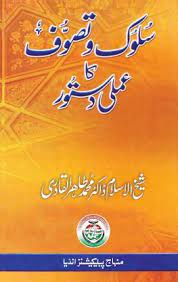An Exploration of Shaykh ul Islam Dr. Muhammad Tahir ul Qadri’s book titled “Sulook Aur Tassawuf Ka Amli Dustoor”
Sufism has been a misunderstood and misrepresented aspect of Islamic tradition for centuries. In the west, it is called a derivative of asceticism & Christianity. In the east, it is called a derivative of Hindu Jog. Its true nature as a true derivative of Quran and Hadith is not known to most people. Common misconceptions about Sufism include the belief that it is separate from mainstream Islam or even contradicts its teachings, that it is focused solely on achieving personal spiritual experiences, or that it is a form of religious extremism.
However, these misconceptions are far from the truth. Sufism is an integral part of Islam, with its roots firmly embedded in the teachings of the Quran and the practices of the Prophet Muhammad (peace be upon him and his family).
Its focus is on developing a deeper, more personal connection with the divine truth through self-reflection, spiritual discipline, and acts of service. By understanding Sufism within the context of Islamic tradition, it is possible to gain a more nuanced and accurate understanding of this important aspect of spirituality. Sufism besides being the mostly misinterpreted is, unfortunately, the most wrongly practiced aspect of Islam also.
Therefore, going back to the authentic sources is a must to do thing in the modern world. Sulook Aur Tassawuf Ka Amli Dustoor, by Shaykh ul Islam Prof. Dr. Muhammad Tahir ul Qadri is a must-read for anyone seeking a deeper understanding of Sufism. In this book, the author sheds light on common misconceptions surrounding this important aspect of Islamic tradition, providing a clear and accurate depiction of Sufism. The book is especially timely given the misinformation and misinterpretations that are currently prevalent. With its well- researched and insightful content, this book is a valuable resource for anyone looking to gain a deeper understanding of Sufism and its place within the context of Islam. Sulook Aur Tassawuf Ka Amli Dustoor (The Practical Methodology of Sufism) is a comprehensive and in-depth examination of the concept of Sufism, its roots, and its evolution throughout history. The book covers a wide range of topics related to Sufism, including the definition and nature of Sufism, its relationship with Islam, and its role in shaping Islamic spirituality and culture. The author draws upon his extensive knowledge of Islamic history, literature,and thought to provide a comprehensive overview of Sufism, and to dispel common misconceptions about this important aspect of Islamic tradition.
The book covers a wide range of topics related to Sufism, including:
1. Definition and nature of Sufism: It provides a clear and comprehensive definition of Sufism and explains its place within the broader context of Islam.
2. Roots of Sufism: It helps to trace the origins of Sufism, exploring its development from early Islamic history to the present day.
3. The role of Sufism in shaping Islamic spirituality and culture: It examines the impact of Sufism on Islamic spirituality and culture, and how it has influenced the development of Islamic art, literature, and thought.
4. Sufism and its relationship with Islam: It explores the relationship between Sufism and Islam, and explains how Sufism complements and enhances the Islamic faith.
5. The principles and practices of Sufism: It provides a detailed examination of the principles and practices of Sufism, including meditation, self-reflection, and devotion.
6. Common misconceptions about Sufism: It addresses common misconceptions about Sufism and provides a clear and accurate understanding of this important aspect of Islamic tradition Shaykh ul Islam Prof. Dr. Muhammad Tahir ul Qadri addresses common misconceptions about Sufism.
He provides a clear and accurate understanding of Sufism and aims to dispel any misunderstandings or false beliefs about this important aspect of Islamic tradition. The author provides explanations and clarifications on various misconceptions related to Sufism, helping readers to gain a deeper and more informed understanding of this spiritual practice and its place within the context of Islam.
Article By: Ishfaq Ahmad,
Minhaj ul Quran International India



